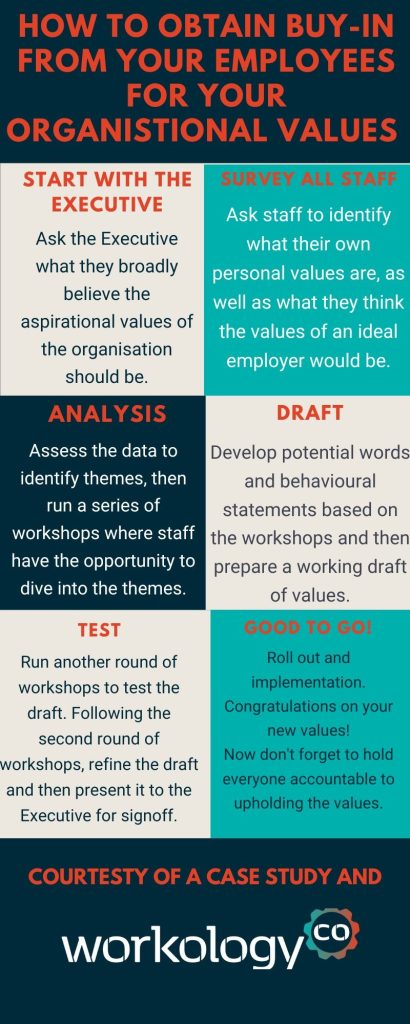As part of my coaching work with clients, I ask them to complete a values exercise where they identify and define their personal top 5 values. This is rarely a straight forward exercise.
I remember the first time I tried to identify my top 5 values, which was during a Brene Brown presentation at Jeff’s Shed in Melbourne.
Brene had helpfully supplied her audience with a list of 116 potential values to kick start our decision making – and then gave us 3 minutes to identify the 5 that resonated most.
3 minutes I tell you! Suffice to say, I did not finalise my list that day.
Why is identifying your individual values important?
Because if we articulate what our values are, and then take conscious steps to live in accordance with our values, we will inevitably be happier.
Your personal values are fundamental to all aspects of your life because they determine what you accomplish and how you accomplish it. Those who do not live by their values too often feel dissatisfied with what they have achieved, as well as their performance along the way. However, following your values ensures that you move ahead with certainty and integrity. [Forbes]
This is true for organisations as much as it is for individuals. Identifying and articulating your organisation’s values have always been an important ingredient of high performance workplace culture; arguably more so at this point in time than any previous time in history.
Why?
I don’t think it would be much of a spoiler alert to say that our old friend Covid and the pandemic is largely to blame.
As we were locked in our homes and cut off from all the busyness that had previously filled our lives, for many of us this turned into an opportunity to reflect on what we truly value in life.
We realised working crazy long hours does not automatically equal success, nor does it usually equate to happiness; in contrast, we came to understand the value of spending time with our family and friends.
Many people made decisions to change jobs – and even careers – on the basis of these lightbulb moments that being locked down ‘gifted us’ with. Which in turn lead to The Great Resignation / Realignment.
Particularly once we started to return to the office after a prolonged period away from the things that used to drive us crazy, (like micromanaging, omnipresent managers) and/ or things we no longer valued. Being back in the office and coming face to face with these things made us realise that we Just Can’t Do It anymore.

Or maybe the main problem is we realised that the values of our current job / organisation are no longer aligned with our personal values. Exhibit A: you, like my son, became a vegan during lockdown. Well, no prizes for guessing you won’t be keen to return to working in the dairy industry.
In either of these cases, it’s really only a matter of time before we are out the door, metaphorically (hello Quiet Quitting) or physically. Or both.
All of this means that values are becoming an increasingly important element in recruitment, as candidates are keen to understand upfront whether prospective employer’s values align with their personal values.
Similarly, consumers are making choices about which companies to buy from, with more than a passing nod to value alignment.
If you’ve ever dined out with me and wondered why I ask ‘which Tasmanian company is the salmon from?’, you will have witnessed my personal demonstration of this in action. [And if you are my children, you will grimace and try to hide your face every time I do this . ]
An organisation’s values can be described as behavioural guidance. They are the principles and beliefs that provide a cohesive vision and define who you are as a business.
In doing so, they define your organisation to employees, stakeholders and customers and remind staff of the preferred way of achieving outcomes.
In essence, they are your “true north” that help you navigate your organisation through prosperous times as well as uncertain periods. ….As a result, they influence the experience of your employees as well as the stakeholders and customers you work with. [Hays]
Values need to be more than a sexy set of statements on the wall.
Absolutely, yes, you SHOULD share your organisational values loudly and proudly, and in as many ways as possible.
But there is little worse from an employee’s perspective, than organisations’ who simply display their values in a pretty way on the wall, and then do nothing to enshrine those values. Or act in a completely contradictory way to said values.
I well remember a time from my brief stint working in government, when our department head unveiled our bright and shiny new values, endorsed from the very top, complete with a values awards program.
Not long after this celebratory unveiling, one of the directors was reading out nominations from her portfolio only to stop mid-sentence and say ‘Aren’t we just praising people for doing the bare minimum of their job?’ #awkward
Organisations need to ensure values are actively lived on a daily basis.

Which means:
Clarity and alignment.
Company values must be aligned to your overall Mission and Purpose; as well as all employees knowing what your business values are, they should also understand HOW the values help the organisation deliver its Mission and fulfill its purpose.
Leaders actively and demonstrably role model the values.
For example, if a commitment to flexible / hybrid work is a stated value of your organisation, then your people need to see leaders walking the talk, not just stating your commitment to flexible work in recruitment videos or via unread policies.
This means leaders need to be actually seen leaving the office early, proudly announcing they are heading off to take their kids to after school sports, as well as deliberately maintaining boundaries and not contacting team members outside of work hours.
You might like working till 11pm at night, but your team members likely do not. So use Delay Send on those emails my friend!
Everyone should be held accountable to living in accordance with your values.
Your values should set the standard by which employees behaviour is measured. If an individual displays behaviour not in accordance with your values, then they should be either performance managed or disciplined (depending on the severity of the behaviour).
For example, one of your values might be ‘Respect’. But sadly, you’ve fallen down in your duty to be on Jerk Alert. Or in other words, one of your star performers has been allowed to get away with inappropriate behaviour, that falls well short of ‘respectful’ behaviour towards team mates.

As noted in our previous blog, J is for Jerk Alert:
Other team members watch the star player getting away with atrocious behaviour and wonder why they can’t get away with simple misdemeanours like being five mins late.
Frustration, resentment, and anger can lead to many things: sometimes disgruntled team members will also start misbehaving, or their performance and productivity will decline.
Why should everyone else tow the line, work their butts off, often for lesser rewards, when the misbehaving jerk gets away with so much?
This is how one unchecked, misbehaving d*$#head can be the catalyst for what becomes a dysfunctional and toxic culture.
All because the organisation was not holding employees to its value of RESPECT.
Your people need to embrace and support your values.
In other words, they need to be meaningful to your employees, and you need their buy-in. Which in turn means that Values are not a ‘one and done’ task item.
Values should be regularly reviewed and if necessary, updated to reflect what your business values today. Not what you valued 10 years ago.
Reward and recognise employees who are living your values, tell stories about them via your intranet / internal newsletter, spruik their achievements, and/or consider providing small rewards.
Keen to know more about reward and recognising your staff? Read our previous blog, ‘R is for Recognition & Reward’ here.
An organisation’s values lay the foundation for what the company cares about most. It provides a common purpose that all employees should understand, work towards and live by. Once you define and promote your values, employees come to understand the behaviours that are expected of them that will lead to success. They recognise and appreciate what the organisation stands for, wants to achieve and how they personally can act to help reach the desired outcomes. [Hays]
How to obtain buy-in from your employees for your values.
Want to know how to obtain employee buy-in to your organisational values?
Here’s a best practice case study for your reading pleasure, that ( because it’s been a while between Infographic drinks], I’ve also turned into said infographic.

Infographic shows the following words:
- Start with the Executive: Ask the Executive what they broadly believe the aspirational values of the organisation should be.
- Survey all staff: Ask staff to identify what their own personal values are, as well as what they think the values of an ideal employer would be.
- Analysis: Assess the data to identify themes, then run a series of workshops where staff have the opportunity to dive into the themes.
- Draft: Develop potential words and behavioural statements based on the workshops and then prepare a working draft of values.
- Test: Run another round of workshops to test the draft. Following the second round of workshops, refine the draft and then present it to the Executive for signoff.
- Good to Go! Roll out and implementation. Congratulations on your new values! Now don’t forget to hold everyone accountable to upholding those values.
- Courtesy of a case study and Workology Co.
In case you didn’t get the message already…
When researching for Workology Co’s white paper back in 2020, I found:
41% of survey respondents nominated the fact ‘our values were lived not just displayed on the wall’ were a key feature of the best workplace culture they had ever worked in.
Contrast too:
53% of survey respondents agreed a lack of alignment between the leadership team’s behaviour and organisational values was a factor impacting their organisation’s move towards exceptional behaviour
In other words: in order to have a high performance / exceptional workplace culture that leads to your business excelling, then your organisation needs to have values that are aligned, meaningful and lived on a daily basis.
Need help with that? Book a time here and let’s chat.
